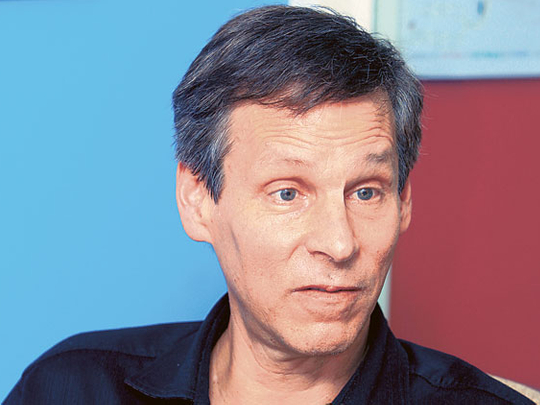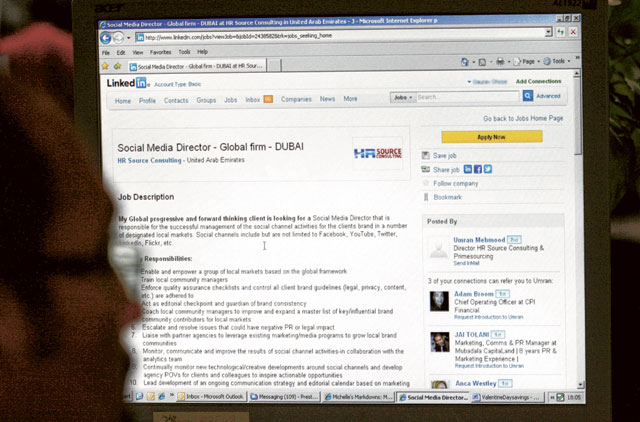
Dubai: Most people these days have LinkedIn accounts but if you ask them how much they interact with others through the website and what value they get out of it, the response is rather lacklustre.
"The biggest challenge when it comes to LinkedIn is that people don't fully grasp what it can do for them. This is from the people who are looking for jobs, to those who are using it for business development and/or networking in general," said LinkedIn expert and entrepreneur Rick Itzkowich.
Itzkowich recently visited Dubai to conduct workshops with students, graduates and professionals on how to profit from LinkedIn relationships. At Hult International Business School he audited students' profiles to expose weaknesses and help them customise their profile for maximum exposure.
Lack of understanding
"There are many people who think that LinkedIn is just a job site, which was originally how it got started, but there's a lot more to it," said Itzkowich.
He has observed that many college students and new graduates are not using LinkedIn and estimates that the main users are between 30 and 50 years old, the majority of them entrepreneurs and sales people.
"If I were to quantify it, I would say 85 per cent have not grasped all of what LinkedIn has to offer."
He describes the site as a phenomenal tool for business development and sales as it allows you to interact with a large pool of individuals who are on the site for the sole purpose of doing business and building relationships.
"When I do presentations, I ask how many have LinkedIn accounts and 90 to 95 per cent of people raise their hand. But when I ask how many of them are getting value and making money out of LinkedIn, hardly any hands go up," he said.
Many professionals create a free account but leave it dormant or it is a poor profile. Itzkowich describes a bad profile as one without a picture and relevant details about your skills and specialities.
"This ends up hurting people. You are communicating that you are disinterested, you don't care, or even worse that you have something to hide."
Protecting one's privacy is a concern for many professionals and many are not willing to divulge their career history or share the contacts in their LinkedIn network with just anybody.
However, Itzkowich explains that "perception is reality whether you like it or not".
"If someone perceives that you're hiding something, there is nothing you can do about it."
He said when people want to find information on an individual and can't or find an incomplete profile, it causes frustration and annoyance. "So you are already starting with a negative perception because we live in a society where we are used to finding what we are looking for online."
Privacy issues
Itzkowich also dismisses people's fears about the invasion of their privacy as unfounded.
"If you go to a networking event, imagine going there with a paper bag over your head. You stand out negatively — that's the equivalent in LinkedIn," he said.
"You would talk to strangers at a networking event so why wouldn't you do that on a website that is purely for business?" he asked.
If you are a business person today you are expected to be on the number one business site in the world just as you would be expected to be on a list of doctors in the medical community, for example.
A complete profile with relevant information is also beneficial because recruiters are looking on LinkedIn first before CVs.
"I've spoken to recruiters, because I get invited to speak to new graduates and college students, and every one of them say they are using LinkedIn — and it's also a starting point for them," said Itzkowich.
He said many human resource managers would not even look at a CV before they go to LinkedIn. They get so many resumes and it's one criteria to start eliminating candidates.
Social insurance
It may not seem worth the trouble to reach out to as many people as possible but the benefits — generating business and getting jobs — are achieved at a later stage, Itskowich said, and referred to the concept of "social insurance", which people fail to grasp.
"As an old Chinese proverb goes: ‘The best time to plant a tree is 20 years ago. And the second best time is now'. It's rather late to start networking when you need to find a job — the time to have started was way before that," he said. "In a word, LinkedIn is about relationships, not technology or jobs."
Furthermore, it is a good idea to widen your network of contacts on LinkedIn because you don't know who your contacts know. Second degree contacts on the site are also worth paying attention to. "It would surprise you how well-connected your colleagues are and they could in turn connect you to those second degree contacts," said Itzkowich.
Currencies of LinkedIn
Another concept he mentioned was the two currencies of LinkedIn — good will and credibility — that people need to become familiar with. Generating the currency of goodwill is about adding value to your network and helping others. Trying to be of use to others is imperative as the people you've helped will be grateful and far more willing to help you in the future.
"One mistake people make is that they ask for stuff from those they have no relationship with. The pay-it-forward mindset is what you need to have on LinkedIn," Itzkowich said.
If you accumulate credibility and trust, you will be able to capitalise on your relationships at a later stage when you need to.
"I have helped so many people on LinkedIn that there are people who would help me if I asked them with no questions asked," said Itzkowich.








